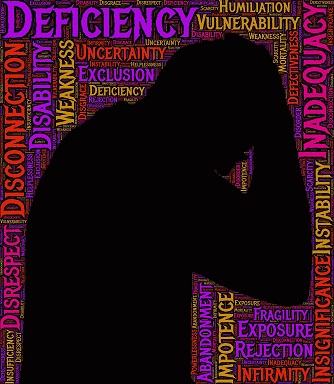Loss of Self-Esteem

We live in a society that is obsessed with physical appearances. Everywhere we look, we are bombarded with the message that how we look, dress or smell and how much we achieve will determine the extent to which we are accepted by others and how well we do in life. So those of us who are not genetically perfect, who struggle with weight or height, or hair or skin or features which don't meet the invisible "right" standard, are automatically disadvantaged, according to that definition. Then add those who are not gifted in sporting ability, or creativity, or with intelligence, and the number of those considered "not good enough", rises. If we finally factor in those who do not have wealth behind them, who are not connected to "important" people, and who do not come from socially advantaged backgrounds, then we are left wondering just who does make the grade.
The answer, of course, is that no one meets all these criteria, so is it any wonder that the world is filled with people who struggle with a permanent sense of worthlessness and inadequacy?
How Do We Lose Our Healthy Self-Esteem?
There is a great deal of evidence which suggests that our self-image and self-esteem are largely locked in by the age of six or seven. While we may tweak our view of ourselves later in life, we will largely cling to the same beliefs and expectations of ourselves, others and life in general, which we hold in early primary school.
- From the moment of birth, we constantly process other peoples' reactions to our every move. Every negative response is interpreted by us as evidence of our failings.
- We do not receive sufficient positive feedback and input, to counteract the negatives.
- We may experience damaging events beyond our control, such as serious illness or the loss of a loved one, which impact how we view the world and ourselves.
- We learn from an early age to assess our value based on our ability (or inability) to compete with others. After all, the prizes in life are awarded to the best, brightest, prettiest, etc.
- As children, we grow in an adult world. Either we are not taught, supported and encouraged, which teaches us we are not capable, or we are over-protected and over-helped, so that we do not master the skills for competency and self-respect.
- We do not receive regular, meaningful acknowledgement for who we are. Positive emphasis is placed on how we look or what we do.
What Does Low Self-Esteem Look Like?
- The pain of not loving and accepting who we are can show itself in behaviours which are designed to numb. These may include substance abuse, workaholism, always trying to please others, or sexually risky choices.
- Frequent negativity towards and criticism of others.
- Easily moved to anger and intolerance.
- Demanding perfection from those around them.
- Prolonged self-rejection can show up in a variety of symptoms, ranging from disturbed sleep patterns, loss of concentration, lack of motivation, changes in eating patterns, anxiety and depression.
- To make themselves feel better, people with low self-esteem will try to dominate, sabotage and intimidate those around them.
- Displaying an extreme overreaction to anything perceived as personal criticism from others.
What Can I Do To Help Myself?
- Learn to get in touch with how you are really feeling. Don't be afraid of acknowledging that you experience difficult or unpleasant emotions. Owning them is the first step to understanding where they come from.
- Resign from your role as judge, jury and executioner, both towards yourself and others.
- Practise being accepting of praise and positive feedback from others. If you push it away, it will stop coming.
- Give yourself permission to speak up about what you think, want, need or feel, and act on that permission.
- Resist the temptation to criticise yourself, both privately and in public.
- Stop comparing yourself unfavourably with others. This will only feed a "not fair" pattern of thinking.
- Develop the habit of speaking positively to and about yourself and others.
Working with a counsellor at Point of Change Counselling service, can help you address the learned patterns which can lock you into poor self-esteem. With encouragement, and non-judgemental support, you can make choices which can shift your focus in a more positive direction.
For help and support with loss of self-esteem, contact Alli at Point Of Change Counselling to make an appointment.
